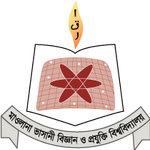History

History
History of the Department of Economics at Mawlana Bhashani Science and Technology University (MBSTU)
The Department of Economics began its journey in the 2012-13 academic session and was officially inaugurated on 9th February 2013 under the leadership of its founding chairman, Prof. Dr. Moniruzzaman. Initially, the department started with three dedicated faculty members: Dr. Md Nazmus Sadekin (Shaon), Md Moniruzzaman Muzib, and Dr. Muhammad Rabiul Islam Liton, along with 55 students and three administrative staff. Operating from a single room in the old trustee board building, this modest beginning laid the foundation for a dynamic academic community.
The department relocated multiple times to accommodate its growing needs: first to a tinshed building, then to the 5th floor of the 3rd academic building. Growth continued steadily, with faculty expansion beginning in 2013 when a member previously affiliated with the Faculty of Engineering (since 2009) joined the department. By 2015, the faculty count rose to six, followed by the addition of five new members in 2018 and another five in 2023. Today, the department boasts 16 faculty members (including three Ph.D. holders), over 300 students, and five administrative staff.
The department’s core objectives are the dissemination of knowledge, quality education, and pragmatic research in economics. It emphasizes job-market-oriented skill development to ensure graduates excel in practical fields. Currently, the department offers both Bachelor of Social Science (B.S.S.) and Master of Social Science (M.S.S.) programs in Economics.
The B.S.S. program spans 40 courses, covering major branches of the discipline. Core subjects include Microeconomics, Macroeconomics, Public Economics, Labour Economics, International Economics, Environmental Economics, and Health Economics. To provide a strong quantitative foundation, the program also incorporates essential courses in Econometrics, Mathematics, and Statistics. Additionally, interdisciplinary courses such as Accounting, Banking, Finance, Sociology, Political Science, Economy of Bangladesh, and Microfinance for Poverty Alleviation are offered to broaden students' perspectives.
The M.S.S. program builds on this foundation, offering advanced courses and research opportunities in specialized areas of economics. Both programs are designed to equip students with the theoretical knowledge and practical skills needed to thrive in academia, research, and the professional world.
Beyond academics, the department fosters holistic growth through seminars on economic and public policies, encouraging critical discourse on contemporary issues. It actively supports extracurricular activities, regularly organizing cultural events, educational outings, and student-led initiatives to nurture creativity and teamwork.
From humble beginnings to its current stature, the Department of Economics at MBSTU remains committed to academic excellence, research innovation, and preparing graduates to thrive in a competitive global landscape. With its robust academic programs, dedicated faculty, and vibrant student community, the department continues to grow as a center of excellence in economics education and research.
